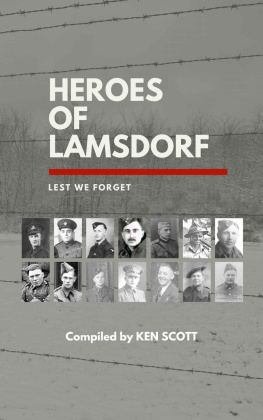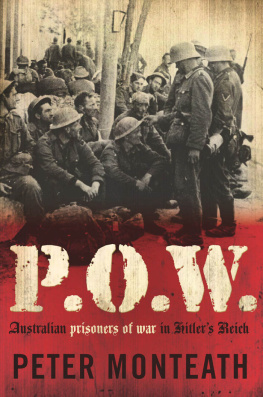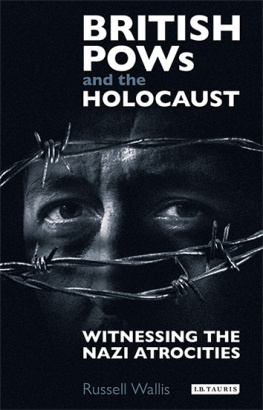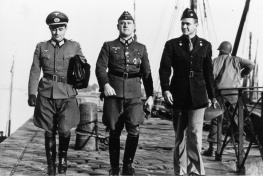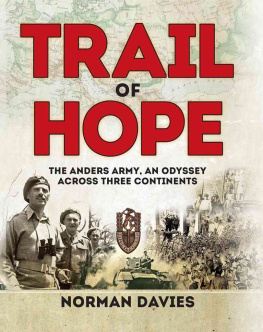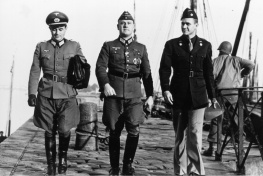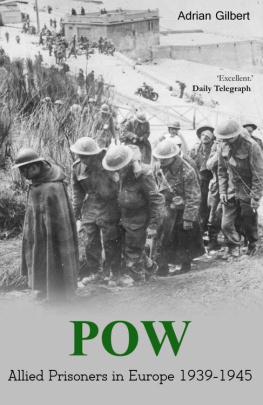Copyright Fortis Publishing.
No part of this book may be reprinted or reproduced or utilised in any form or by any form or by any electronic, mechanical, or other means, now known or hereafter invented, including photocopying and recording, or in any information storage or retrieval system, without permission in writing from the publishers.
This book is dedicated to Prisoners of War everywhere, in every war ever to have taken place, to those who died in captivity and those who survived.
PREFACE
Over the years as a ghost-writer, I have been introduced to many incredible stories relating to the very real personal trauma and torment of those who found themselves thrust into a war that most of them wanted no part of.
WWII, as we know, was the bloodiest conflict the world has ever seen with up to fifty million military and civilian deaths worldwide. But they werent they only victims. As well as the maimed and injured, there were those who Philip Baker (in his excellent foreword that follows) rightly calls the survivors, the military men and women who were captured by the enemy and thrust into the toughest battle of their lives.
My first foray into a prisoner of war (POW) book was Do the Birds Still Sing in Hell? , nearly twelve years ago. I felt very honoured and yet humbled to sit down and speak with the late, great, Horace Greasley, then aged 89, who had spent five years at Lamsdorf VIII-B, (later renumbered Stalag-344), and the surrounding work camps.
The two years I spent with Horace changed my life as he opened up and spilled raw emotion each and every time I sat with him. We shed tears of laughter and sadness and became great friends, we shared a gin and tonic every Friday right up to the day he died.
Horace told me stories of love, respect, suicide, revenge, torture and torment, boredom and frustration. He described how evil and how kind and compassionate the creature known as Man can be.
As soon as the book was published I received another POW book commission and then, a few years later, another. I wrote further books on WWII and the Spanish Civil War. This was followed by a book about the war in the former Yugoslavia, about an 18-year-old girl taken prisoner by the Kosovan Liberation Army and then, as the war neared its conclusion and she managed to escape, how the Serbian Army imprisoned her again.
I quickly realised that POW books interested me more than any subject I had covered, the research alone can consume you for days on end. When the opportunity arose to co-author another Lamsdorf prisoner's book, I did not hesitate to give it a thumbs-up, and in late 2021 John West's book, The Psychiatrist , was completed.
John and I made the journey to Lamsdorf and the surrounding area in December 2021. It was cold, with snow on the ground. Only by visiting those bleak surroundings at that time of year can you appreciate just how hard the battle to survive really was.
I consumed POW books voraciously and more than twelve months ago, on a whim, I posted on the Lamsdorf Facebook group, asking how many more unpublished POW stories were out there. The response was overwhelming and this book was born.
I'd like to think there are still more untold stories to be unearthed and I look upon it as my duty to humanity to keep digging, and to keep these stories alive in order that the younger generation appreciates what these prisoners went through. I also like to think that there may be future politicians who will read these stories of fortitude, sacrifice and survival and that, somehow, authors like me may just have a small influence on how the future is shaped.
If you have a story that you think is worthy of a book, please do not hesitate to contact me.
Ken Scott
www. kenscottbooks.com
kenscottbooks@gmail.com
FOREWORD
In May 1945 a group of recently liberated British former prisoners of war were lodging with British troops in Lbeck whilst awaiting repatriation. One evening they decided to watch an Entertainments National Service Association show being held in this former German Army camp. A sergeant at the door refused them entry, as the show was, only for fighting men.
In their few days there, the men had become dispirited by being on the receiving end of this sort of ignorant attitude from other soldiers, including remarks about white feathers and the colour yellow, which they hadnt expected at all. Luckily for them the incident was witnessed by an ATS (Womens Army) sergeant, who angrily told the man on the door that, unlike these former POWs, he had never heard a shot fired in anger, particularly as he was only a signaller, well behind the lines. She propelled them into the show and explained to an officer what had happened. He immediately cleared space in the front row for them and treated them with great respect.
These were fighting men indeed, having been captured in combat on land, sea or in the air and they had seen many of their comrades fall in action. Having become prisoners of war, they then had to spend the next few years in another fight, one for survival.
But what was it actually like to be a prisoner of war? Something that I have discovered in more than twenty years of researching and recording the history of prisoners of war, is that it is impossible to generalise at all about what life was like at Stalag VIII-B/344 Lamsdorf and its working parties, or indeed about any POW experience anywhere. Some years ago I was able to talk to a few of the former POWs who were still alive. I have read many books written by ex-inmates of Lamsdorf and other camps, many other books on the same subject and very many personal accounts sent to me by former POWs or by their relatives. All this comprise a vast amount of information and opinion, and this has convinced me that is very difficult to sum up the POW experience briefly and to remain fair and accurate, simply because the experience was so complex, involving many differing experiences, reactions, and impressions from different people. For anyone to say that this camp was like this or the working parties were like that or the guards behaved in such-and-such a way cannot convey the whole truth because there were so many widely-varying experiences and recollections.
Stalag VIII-B/344 was a vast camp. Its size varied through the years, but at its peak in 1943 it contained just over 31000 men, not including the thousands who were in hundreds of working parties scattered over a large area. Just like any town, different parts of this huge camp had their own characteristics. All branches of the armed forces were represented and there were men of many nationalities, often in separate compounds. The perceptions and experiences of one man in one hut, perhaps with people he didnt get on with very well, perhaps bored, miserable, lonely, apathetic, or depressed, might have been hugely different to another man in another compound or even in the next hut, who was among good friends, who was involved in sporting or cultural activities and whose morale was generally higher.
Multiply this by the tens of thousands of men there and you can see how accounts of what life was like as a prisoner of war can differ considerably.
It is also true that the camp changed very much in the course of time. One POW arriving at Lamsdorf in 1940 described it as a depressing place with lads ambling about like lost souls with nothing to do all day. He subsequently spent eighteen months away on a working party, and when he returned he found that, Lamsdorf had changed beyond belief. It was like a small town, with institutions, a sick bay for minor ailments and an efficient organised, equipped, and staffed hospital. There was also a school, and orchestra, various bands, concert parties, drama groups and sports of all descriptions. There was now no excuse to amble about like zombies.

